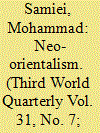| Srl | Item |
| 1 |
ID:
192244


|
|
|
|
|
| Summary/Abstract |
The use of chemical weapons (CW) by Iraq during the Iran-Iraq War appears to have been subject to far less decisive US responses than similar accusations against Syria during the Syrian civil war. However, the two instances have not yet been subject to direct scholarly comparison. This article treats the Iraqi and Syrian instances as two distinct cases and compares US actions to prevent, investigate and deter CW use on each occasion. After demonstrating that the US responded more decisively to the allegations against Syria, we then employ process tracing to locate both cases within existing theoretical discussions of US intervention in the global South generally, as well as CW norm enforcement in particular. In doing so, we propose that, in addition to other factors including the US aspiration to world dominance and its resultant framing of its material and security interests as well as a lesser regard for citizens of the global South, the anti-US stance of either the CW perpetrator or victim can also affect how the US responds to accusations of CW norm violation. This casts further doubt on the veracity of stated humanitarian motives for US intervention abroad.
|
|
|
|
|
|
|
|
|
|
|
|
|
|
|
|
| 2 |
ID:
100325


|
|
|
|
|
| Publication |
2010.
|
| Summary/Abstract |
Orientalism, as Edward Said used the term, can be defined as an ideology which promotes the 'West-and-Islam' dualism and the idea that 'Others are less human'. Since Said first published his ideas in 1978, however, the world seems to have become much more interdependent and political interrelations between the West and Islam have changed dramatically. Consequently this dualism, though more or less in place, has been influenced by escalating waves of globalisation and redistributed and reshaped in a different form. Some promising changes, as well as some additional dualistic tendencies, that can define neo-Orientalism are found in this new era. This paper attempts to analyse elements of change in traditional Orientalism. To portray a better future for our interdependent world some new approaches to identity, global ethics and global civil society are suggested. Eradicating the roots of Orientalism and Occidentalism alike and accepting, protecting and even promoting diversity are first steps towards countering the devastating threats that endanger humankind as a whole.
|
|
|
|
|
|
|
|
|
|
|
|
|
|
|
|